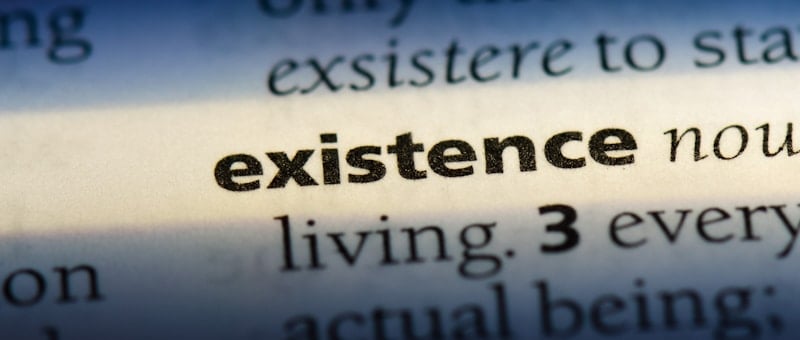Sometimes a person’s spoken, and written words reveal something about their character. That person writes and says it as they understand it, which could confuse the spelling of a word. Is it “existance” or “existence”?
“Existence” means “the state of having or being, independently of human consciousness.” It is the knowledge of all forms of reality. Additionally, it is the ability to be aware of the exact presence and occurrence of something. “Existance” is a misspelling of the word existence.
The definition of a word like existence includes a lot of baggage. The description of the word will bring us answers to questions about the meaning of life and help us understand our existence. Existence is not only being real but also believing that something or someone is real. The word could also be defined as “the state of being alive or real.”

For example, a person that believes that BigFoot is real believes in the existence of BigFoot. As such, there could be a difference in the interpretation of existence. A person may believe in BigFoot while others don’t. The same thing applies to gods and religion. A group of people may believe in it, and others don’t. These are examples of a disagreement about the word existence.
The Dictionary of Philosophy defined the word existence as “empirical reality, the substance of the physical universe.” This means that existence is something that is proved through observation and evidence. It is something that is opposed to the imagination. To put it in simpler terms, a reality.
What About The Word “Existance”?
The word “existance” probably owes its origins to how existence sounds when spoken. Take, for example, the word “substance.” The second part of the word “substance” sounds very similar to “existence.” Confusion might have risen from a similar situation. Additionally, historically the word “existance” has been used by many authors in their books. American authors like Herman Melville and Henry David Thoreau have both used the word “existance” in their works.
British authors like Arthur Conan Doyle and C.S. Lewis also employed it. As a result, for a long time, it was meant to believe that maybe the difference in spelling was due to the differences between North American and British English. To better explain this, let’s suppose the authors of the adventures of “Sherlock Holmes’ ‘ and “Chronicles of Narnia’ ‘ wrote “existance” in their writings. This would lead us to believe that it is a real word. Right? Well, not exactly. It is still a common misspelling of “existence.”
C.S Lewis confirms the misspelling in a vivid letter to the Times Educational Supplement, a British publication about education first published in 1910. Lewis defended using the word “existance,” considering there is a distinctive use of words depending on the person. Part of the letter reads: “But for the rest, who would be a penny the worse if though and tho, existence and existance, sieze, seize and seeze were all equally tolerated?”
C.S. Lewis questioned the apparent necessity for everyone to spell the same way. He even said that sometimes logic is more important when analyzing a common person’s writing. Conan Doyle, Thoreau, Melville, and C.S Lewis were all known to have common writing for their times. It is one of the reasons why their books reach a broad audience.

Origin Of The Word “Existence”
The origin of the word is from the 14th century. “Existence” comes from the Old French word “existence.” Additionally, from the Medieval Latin Existentia, Exsistentia; from Latin existere, meaning to stand forth, emerge, appear, and be visible.
How To Use “Existence” In Sentences
The most common use of the word existence is to refer to something or someone real, a person that exists or has existed. Examples:
- People need to acknowledge the existence of a pandemic so they can take proper precautions.
- A lot of people believed in the existence of many gods. I only believed in one.
- Maria is obsessed with proving the existence of ghosts. She has slept in that abandoned house for the past week.
- The meaning of our existence is still beyond our understanding.
- Being loved is one of the greatest feelings of our existence.
Synonyms for existence
We can use several terms to describe something similar to the word existence, such as actuality, reality, and subsistence.
Actuality: the quality of being actual. A fact. For example, the damaging effects of the new virus are an actuality.
Reality: the state of being real. For example, going out late at night is still dangerous, that’s the reality of our town.
Subsistence: the condition of remaining in existence. For example, a healthy planet is vital for our subsistence.
Antonyms For “Existence”
People may be confused and think that the opposite of “existence” is death. However, dying implies you already existed. Therefore, here are a few terms that can indicate the opposite of existence: inexistent, nonbeing, and nonexistent.
Inexistent: not having existence. For example, the evidence of people getting chips into their bodies for being controlled is inexistent.
Nonbeing: absence or lack of being. For example, many people believe in nonbeings because it makes their lives easier.
Nonexistent: the absence of existence or Negation of being. For example, Your feelings towards me have always been nonexistent.

Is There A Meaning To Existence?
When people talk about existence, they tend to become philosophers and try to explain the meaning of life. We are not going to do this here, but there is always room for light conversation about existence.
Experts in psychology say that people understand the meaning of existence as being happy. Hence, people search for happiness wherever they can find it. But finding happiness for the sake of it leads to a fleeting moment and plenty of disappointment.
Antti Kauppinen, a philosophy professor from Finland, states that: “while purpose and happiness are distinctly different concepts, feeling a sense of meaning in your life can be a key factor in experiencing happiness.”
This quote refers to the need to look for a purpose to understand one’s existence and achieve a deeper happiness level—that meaning changes with age. When we are young, happiness is excitement; when we get older, happiness is peace. Experts say there are four simple factors to follow to be able to achieve meaning in existence. These are:
- Mental and physical well-being: this means taking care of your state of mind, emotional education, and your body.
- Belonging and recognition: referring to being valued and validated. Feeling like your peers understand you.
- Personally treasured activities: hobbies, spending time with family, learning to spend time with yourself.
- Spiritual closeness and connectedness: feeling related to all the living things in the world or finding mental peace thanks to religion.
The meaning of existence for a person changes constantly. It could change after a significant or minor event in a person’s life. Self-reflection is often recommended in these cases. It is the best way to find what matters in a person’s life.
Conclusion
Even by definition, the word “existence” brings a thorough and sometimes difficult conversation. Existence is the state of being alive and being real. “Existance” is a misspelling of the word “existence,” a prevalent one. As a general rule, we just need to remember that sometimes words are not necessarily written in the same way that they sound.
Shawn Manaher is the founder and CEO of The Content Authority. He’s one part content manager, one part writing ninja organizer, and two parts leader of top content creators. You don’t even want to know what he calls pancakes.

